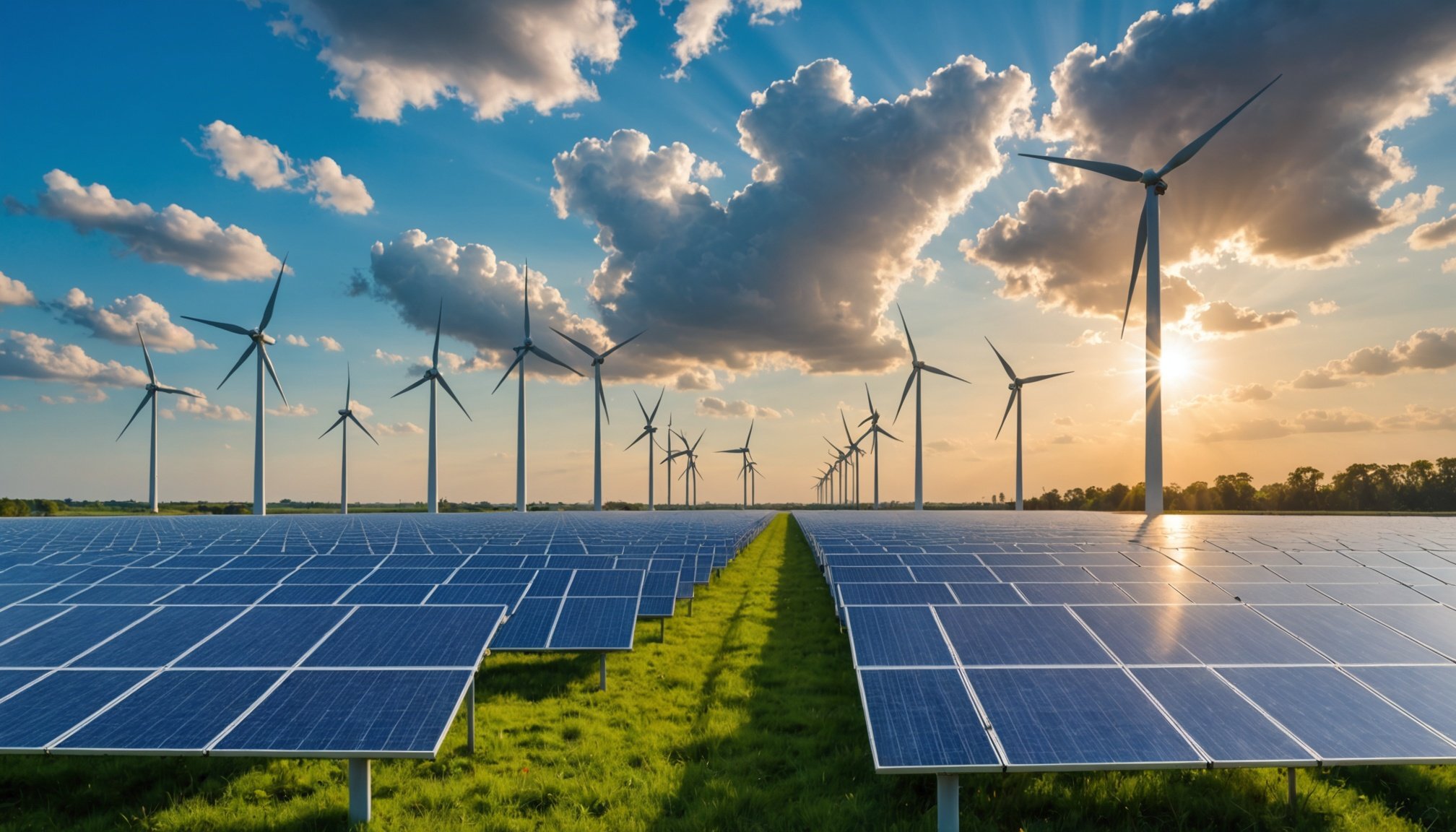Overview of AI in Renewable Energy Management
Artificial Intelligence (AI) is revolutionizing renewable energy management by improving efficiency and optimizing processes. At its core, AI refers to systems capable of performing tasks that, when done by humans, require intelligence. In renewable energy, AI’s role is pivotal in forecasting, predictive maintenance, and real-time data analysis.
AI enhances management practices by enabling smarter grid systems. For instance, AI systems can predict energy demand and generation patterns, allowing for better resource allocation. This improvement minimizes waste and ensures your energy systems operate at their highest efficiency. Furthermore, AI-driven analytics can pinpoint inefficiencies, suggesting proactive measures to mitigate issues.
In parallel : Enhancing smart home living: how ai is redefining user experience in automation
The importance of efficiency in renewable energy systems cannot be overstated. Efficient systems reduce costs and increase the lifespan of renewable energy installations. Moreover, as renewable energy sources like wind and solar are inherently variable, AI helps balance these fluctuations, ensuring stable energy supply. By doing so, renewable energy not only becomes more cost-effective but also more reliable.
In summary, the integration of AI in renewable energy management is crucial for maximizing system performance. AI-driven solutions create a more sustainable and efficient energy future by optimizing energy production and distribution, thus enhancing overall system efficacy.
Additional reading : How product lifecycle management enhances cybersecurity efforts
Case Studies of AI Applications in Renewable Energy
Exploring the potential of AI applications within renewable energy reveals numerous exciting developments. Let’s examine how AI is transforming solar, wind, and energy storage sectors through diverse case studies.
Solar Energy Optimization
AI has revolutionised solar energy optimization by enhancing energy forecasting and load management. A notable case study involves a large-scale solar installation where AI improved solar panel efficiency. By analysing weather data and historical performance, AI can predict energy production levels, adjust load distribution, and maximise energy usage. This intelligent forecasting ensures that solar resources are efficiently utilised, significantly boosting overall system output and sustainability.
Wind Energy Management
In the realm of wind energy, AI applications excel in predictive maintenance. An exemplary case showcases AI’s role in enhancing turbine output. By analysing data from sensor networks, AI predicts maintenance needs before breakdowns occur, reducing downtime and increasing efficiency. This proactive approach not only extends equipment lifespan but also helps in achieving optimal energy production levels, ensuring a stable supply of wind energy.
Energy Storage Solutions
AI impacts energy storage systems significantly, especially in battery management. A case study of AI-driven optimization demonstrates its utility in maintaining grid stability. AI algorithms efficiently manage battery charge cycles, predict energy demand spikes, and balance supply, ensuring consistent energy availability. This results in a more resilient and adaptable storage infrastructure essential for integrating renewable energy sources into the grid.
Technological Insights
AI technology is revolutionising the renewable energy sector by optimising processes and enhancing efficiency. Key AI technologies, such as machine learning algorithms, are pivotal in predicting energy demand and supply, thereby ensuring optimal energy distribution. Moreover, AI technology plays a crucial role in monitoring the health and maintenance of renewable energy systems, which helps prevent costly downtimes.
Data analytics is equally significant in the realm of energy management. By analysing vast amounts of data, energy providers can identify consumption patterns and optimise energy use. This leads to improved grid management and reduced waste. The insights gained through data analytics allow for precise monitoring of system performance, facilitating proactive maintenance and efficient resource allocation.
The integration of the Internet of Things (IoT) with AI further enhances energy efficiency. IoT devices, equipped with sensors, collect real-time data on energy usage and environmental conditions. This data, analysed by AI technology, enables smart decision-making processes, such as adjusting energy output based on current demands or conditions. The synergy of IoT and AI fosters a more sustainable and intelligent energy ecosystem.
Incorporating AI, data analytics, and IoT not only supports renewable energy systems but also drives a more sustainable future by ensuring wise resource usage and energy conservation.
Benefits of AI in Renewable Energy Management
Embracing AI technology in managing renewable resources provides substantial efficiency gains. By automating routine tasks, AI optimises operational workflows, ensuring renewable energy sites operate at peak efficiency. This focus on automation not only boosts energy output but also enables operators to address issues proactively, reducing downtime and enhancing overall system performance.
A pivotal advantage of AI is the significant cost reduction it achieves in energy management. AI-driven solutions predict equipment failures, allowing for timely maintenance which minimizes costly repairs and replacements. Additionally, these systems facilitate better resource allocation, significantly cutting operational costs. AI’s predictive capabilities help prevent unnecessary energy wastage and enhance the long-term sustainability of energy assets.
Efficiency and Decision-Making
AI substantially enhances decision-making processes in energy management by providing data-driven insights. Operators can analyse vast amounts of data to identify patterns, optimise performance, and anticipate future energy demands. AI-powered analytics deliver real-time updates, enabling instant adjustments to energy outputs and ensuring alignment with consumption patterns. These insights allow energy managers to forecast requirements accurately, balancing supply with demand effectively.
Moreover, AI contributes to maintaining grid stability. By predicting energy surges or deficits, AI assists in swiftly adapting to fluctuations, ensuring a reliable energy supply. As such, AI not only increases efficiency but also reinforces the dependability of renewable energy systems.
Future Trends in AI and Renewable Energy
The integration of AI advancements with renewable energy strategies is set to transform the energy landscape significantly. AI technologies are expected to optimize energy consumption and enhance the efficiency of renewable energy systems. For instance, machine learning algorithms can analyze vast datasets to predict energy demand patterns, enabling more efficient resource allocation.
Predictions show that AI will play a crucial role in achieving global sustainability goals. By optimizing renewable energy generation and distribution, AI can reduce energy waste and lower carbon emissions. This means fewer resources are needed to produce the same amount of energy, maintaining environmental integrity.
The potential influence of AI on global energy policies and regulations cannot be overstated. AI can assist policymakers in designing more effective regulations by providing insights into energy trends and consumption patterns. By simulating various scenarios, AI can offer data-driven recommendations that guide policy decisions toward more sustainable practices.
Expected advancements in AI technologies could lead to smarter grid systems, seamless energy integration, and ultimately, sustainable urban development. These future trends not only promise to revolutionize how we consume and manage energy but also align with the broader goals of environmental conservation and resource efficiency.
Expert Opinions and Insights
Gaining expert opinions on the integration of AI into renewable energy is invaluable for understanding the complexities involved. Industry leaders are at the forefront, pushing boundaries by merging AI technology with energy sectors. Notable voices signal that while AI offers transformative potential, deploying it requires addressing several renewable energy challenges.
One major obstacle acknowledged by experts includes data integration. AI heavily relies on vast and varied datasets, and consolidating this information effectively poses a significant hurdle. Moreover, adapting current infrastructure to support AI advancements is an ongoing issue, as it demands extensive investment and well-coordinated management.
Despite these challenges, the industry remains optimistic. Tech and energy professionals share a positive future outlook, emphasising AI’s role in improving energy efficiency and predictive capabilities. Experts foresee an era where AI not only optimises resource usage but also contributes to sustainable energy production and consumption, signifying a promising advancement in energy management systems.
As industry insights suggest, close collaboration between tech developers, energy providers, and policymakers is crucial. This cooperative effort can help realise the vast potential of AI, cementing its place as a catalyst in the evolution of renewable energy landscapes.






